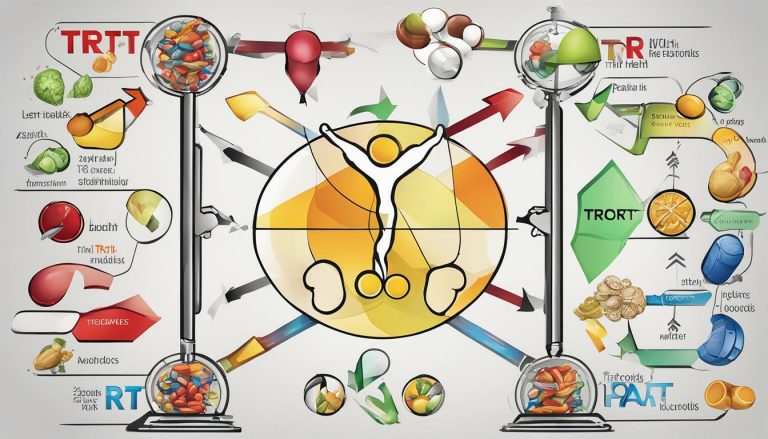Explaining Why You Can’t Use NSAIDs and Steroids Together
NSAIDs (Nonsteroidal anti-inflammatory drugs) and steroids are two common medications used to manage pain, inflammation, and other conditions. However, taking them together can be dangerous and may lead to harmful side effects. In this article, we will discuss why combining NSAIDs and steroids is contraindicated and explore the risks associated with this practice.
NSAIDs are typically used for their anti-inflammatory properties and include drugs such as aspirin, ibuprofen, and naproxen. Steroids, on the other hand, are synthetic hormones that help to reduce inflammation and swelling. They are commonly prescribed for allergies, asthma, and autoimmune diseases.
While both NSAIDs and steroids are effective in managing pain and inflammation, taking them together can lead to interactions that may harm your health. This is why healthcare professionals advise against using them concurrently.
Key Takeaways
- Combining NSAIDs and steroids is contraindicated.
- The risks associated with taking NSAIDs and steroids concurrently can be harmful.
- It’s important to understand the interactions and side effects of taking these medications together.
Understanding the Contraindication
NSAIDs and steroids are known to have numerous benefits in managing various conditions, from pain relief to inflammation reduction. However, using both of them together can cause severe health risks. It is because both classes of medications work in similar ways, and concurrently taking them can lead to harmful interactions.
The contraindication of NSAIDs and steroids means that various medical conditions can be worsened by taking these drugs concurrently. Patients with a history of heart diseases, stomach ulcers, and kidney problems should avoid taking NSAIDs and steroids together. Besides, pregnant women, individuals with diabetes, and those taking blood thinners should also avoid combining these drugs.
Before combining any medications, it is crucial to consult a doctor and understand the precautions fully. Any changes in drug regimens should be closely monitored to alleviate potential health risks or complications. Patients should also inform their healthcare providers about any medical conditions or medications they are taking, as they may affect the usage or dosage of NSAIDs and steroids.
Interactions and Side Effects
When taking NSAIDs and steroids concurrently, there is an increased risk of adverse reactions and interactions. Some of the most commonly reported side effects include gastrointestinal bleeding, ulcers, and stomach upset. Additionally, there is an increased risk of kidney damage, high blood pressure, and fluid retention.
The risk of interactions and side effects is further increased when taking high doses of either medication or when taking them for an extended period. Therefore, it is important to use these medications only as directed by a healthcare professional and to report any unusual symptoms or side effects immediately.
Interactions
NSAIDs and steroids are both metabolized in the liver and may compete for the same metabolic pathways, leading to increased levels of the medication in the bloodstream. This interaction can cause adverse reactions, such as gastrointestinal bleeding, stomach ulcers, and kidney damage.
Furthermore, concurrent use of NSAIDs and steroids can increase the risk of bleeding and bruising, especially if the person is also taking blood-thinning medications such as warfarin.
Side Effects
Common side effects associated with NSAIDs include stomach upset, nausea, vomiting, and diarrhea. Long-term use of these medications can also lead to kidney damage, high blood pressure, and fluid retention.
Steroids, on the other hand, can cause side effects such as weight gain, increased appetite, and mood changes. Long-term use of these medications can also lead to osteoporosis, cataracts, and muscle weakness.
In conclusion, the interaction between NSAIDs and steroids can lead to increased risks of adverse reactions and side effects. It is important to use these medications only as directed by a healthcare professional and to report any unusual symptoms or side effects immediately.
Alternatives to NSAIDs and Steroids
If you have been advised against taking NSAIDs and steroids together, you might be feeling concerned about what alternative treatments are available. Fortunately, there are several options you can consider that can help alleviate your symptoms without the risks associated with NSAIDs and steroids.
Acetaminophen (paracetamol): This over-the-counter medication is a good alternative to NSAIDs and steroids as it helps relieve pain and reduce fever. It works by blocking the production of prostaglandins, which are responsible for causing pain and fever in the body.
Physical therapy: Depending on your condition, physical therapy may be an effective treatment option. Physical therapy involves performing specific exercises that can help improve strength, flexibility, and mobility, which can help relieve pain and prevent further injury.
Massage therapy: Massage therapy can help relieve muscle tension and improve flexibility, which can help alleviate pain caused by certain conditions like arthritis. It can also help reduce stress and promote relaxation.
Hot and cold therapy: Applying heat or cold to the affected area can help reduce pain and inflammation. Alternating between hot and cold can provide even greater relief, as the cold helps reduce swelling while the heat helps promote circulation and healing.
Herbal remedies: Some people have found relief from symptoms by using herbal remedies like turmeric, ginger, and willow bark. However, it’s important to note that herbal remedies can interact with other medications, so you should check with your healthcare provider before trying them.
While these alternatives can be a useful option for patients who cannot take NSAIDs and steroids, it’s important to talk to your healthcare provider before trying any new treatments. They can help you make an informed decision and determine the best course of action for managing your symptoms.
Safe Use of Medication in Australia
Ensuring the safe use of medication is a top priority in Australia’s healthcare system. The Therapeutic Goods Administration (TGA) is responsible for regulating and approving medicines in Australia. They work with healthcare professionals and consumers to ensure that medicines are safe, effective, and of high quality.
It’s essential to follow medication instructions carefully and only use medications that have been prescribed or recommended by a healthcare professional. The TGA recommends that individuals always read the label and leaflet that comes with the medicine, including any warnings and precautions.
It’s also important to be aware of any potential interactions between medicines, including NSAIDs and steroids. Individuals should inform their healthcare provider of all medications they are taking to avoid any harmful interactions and ensure that they are not taking these medications concurrently.
Patients are encouraged to report any adverse effects experienced with medicines to their healthcare professional or to the TGA via the Adverse Drug Reactions (ADR) Program. This is an important step in promoting medication safety and enabling the TGA to take appropriate action if necessary.
Conclusion
In conclusion, it’s crucial to understand the risks associated with taking NSAIDs and steroids concurrently. As we’ve discussed, these medications can cause serious interactions and side effects. It’s important to always follow the advice of your healthcare professional and avoid self-medicating with these drugs.
If you have a condition which requires the use of NSAIDs or steroids, be sure to discuss alternative options with your doctor. There are several safe and effective alternatives available that can help manage your symptoms without putting you at risk of serious side effects.
Remember, safe use of medication is essential in Australia. Always read the label, follow the recommended dosage and never hesitate to reach out to your healthcare professional if you have any questions or concerns. By taking these precautions, you can ensure that you’re getting the most benefit from your medication while minimising the risk of harm.






